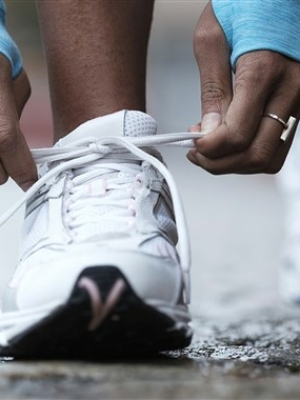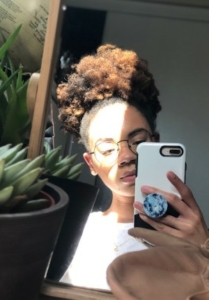My Parents Didn’t Have a Personal Library
Let me start with a story from high school.
I used to run track. I ran it for two years. I did it mainly because I love running, but I also wanted to be like my father who played on the basketball, football, and track teams when he was in high school, on top of being an A student.
I don’t have a letterman jacket. I don’t have any medals. I don’t have the one picture I took with the team when I was on it.
Why?
Because my coach never put me in a single meet.
Let me explain. My coach, who was an older woman, took one look at my long legs and told me I had potential, that because I had long legs and a good running time, I could do great things for the team.
But, she never properly trained me, or any of the other girls on the team for that matter.
I was a fast runner, but I was also very weak. My stamina was low and my core muscles were underdeveloped, something that could’ve easily been remedied had my coach put me on a proper regime. She never put anyone on a regime to strengthen their core, or increase their stamina, or train against wind resistance. Instead what she did was run us until we were all exhausted.
 I would run at practice, pain beating in my right side in time with my heart, and ignore it like it didn’t hurt. I listened to my coach as she told me, “I can see when the monkey jumps on your back.” I ran some more with the pain, my tennis shoes clipping my ankles as I ran because I was leaning to take off some of the pain. And then, after practice, I would go home and run on the old, half-broken treadmill in my mother’s office, because I believed that if I ran some more, I could beat the pain that bled from my right side until it covered my entire stomach, my weak abdominal muscles struggling to keep me upright. It wasn’t until I finished high school, college, began an MFA Program, that I realized running required more than just running. It worked the whole body and the whole body needed to be strong.
I would run at practice, pain beating in my right side in time with my heart, and ignore it like it didn’t hurt. I listened to my coach as she told me, “I can see when the monkey jumps on your back.” I ran some more with the pain, my tennis shoes clipping my ankles as I ran because I was leaning to take off some of the pain. And then, after practice, I would go home and run on the old, half-broken treadmill in my mother’s office, because I believed that if I ran some more, I could beat the pain that bled from my right side until it covered my entire stomach, my weak abdominal muscles struggling to keep me upright. It wasn’t until I finished high school, college, began an MFA Program, that I realized running required more than just running. It worked the whole body and the whole body needed to be strong.
I, and many other girls, never ran a single meet, because the time was never taken to hone the weaknesses that prevented us from realizing our full potential.
There were other girls on the team who ran in every meet who felt like they were being run to death while the rest of us sat on the sidelines. These girls complained to the coach about not properly training us, those of us who were left to sit on the sidelines, and not seeing what we could do and trying us in different positions. These were the naturally talented girls, who begged the coach to let all of us to do the same exercises as the boys team. Girls who played on the basketball and volleyball teams when those were in season or who were just naturally fast and strong. Girls who did not need to be trained, who did not need unique regimens to overcome their weaknesses, but still desired them.
My freshman year on the track team, my coach replaced me with an eighth grader who was faster than me. As I cried, she explained to me that sometimes potential isn’t enough, that I could run everyday yet still not be good enough. That people are born with a certain talent, and others are just not, and sometimes it doesn’t matter how hard someone works, that they could work at something everyday and just never be good at it. That talents can’t be learned, skills can’t be cultivated. People are either born with or without. My coach’s name has been lost to time, but what she said to me hasn’t.
I would try out for the track team two more times. Sophomore year, she was still the coach and I didn’t make the team. Junior year she was not and I did. That year, our coaches were male and we all hoped that we’d be trained like the boys, working in the weight room and not just on rainy days, running with parachutes on our backs to help with resistance training, and with everyone having the opportunity to run in a meet.
But that didn’t happen. Nothing changed. The male coaches worked us the same as the old coach did. I didn’t try harder because I believed that my “talent” would finally come through and inspire them to let me run in a game.
It didn’t.
I never competed. During my freshman year, I only attended one meet. I was an alternate, which meant if a girl didn’t show up, or couldn’t run, I would take her place. The girl pleaded with my coach to let her sit the 4x4and put me in, my coach refused and made her run. The girl placed, even through her exhaustion, while I sat under our team’s tarp, put up earlier to protect us from the Mississippi sun. I thought everything was simply down to luck and talent, and I was just unlucky and untalented. Later, I was cut from the team. I was—and probably still am—bitter that I never got a letterman jacket, even if my high school’s jackets were ugly.
I stopped running. My father tried to encourage me to try out for my college’s track team. I refused. All I could think about were the girls who were more talented than I was, who ran on their highschool’s track teams, who would be picked instead of me.
* * *
 So, what does this have to do with writing?
So, what does this have to do with writing?
When it comes to anything in the arts, many believe that good art is something that doesn’t have to be learned, it’s an innate talent that you either have or don’t. Talent is something you have to be born with, so if you don’t already have it why try and get better at the arts at all? Talent implies that you’ve already failed before you’ve even began.
Before, and even when I started my MFA Program, I had no intentions of becoming a real writer. I thought that writing books was something you were born with.
I’ve heard a lot of people say that going to school to learn how to write, or to earn a degree in the arts in general, is a waste of money. I was convinced that writing is a talent and that all someone has to do is write everyday and they too can be good at it.
But writing, especially good and great writing, is a skill that needs to be learned.
Not everyone had a parent, or two, who were writers, or had bookcases full of writing to read every day starting at the age of three. Not everyone became a genius by eight, won prizes by thirteen, or published a book before the age of twenty-five. Some of us lacked the access or education that would’ve allowed us to become good writers. It made it so that becoming a good writer wasn’t easy.
The idea that good and great writing is somehow innate pushes those who had the potential but aren’t properly trained to the sidelines. Everyone has potential; nobody is ever just born being great at the arts.
Some people become great writers with ease due to accessibility, tools they probably won’t mention because they assume everyone else had them too. Other people need time specifically dedicated to learning to write with the help of someone who has years of experience.
You don’t necessarily need a degree to be good or great at something. But, to say that you don’t need a degree to be good at the arts usually comes from the mouth of someone with an immense amount of privilege, who had the tools, education, support that allowed them to be great. Talent and implied geniusness are always held up over taking the time to master a skill.
 A friend asked me what was the point of learning to write, saying that it was something everyone knew how to do. They thought that spending money to get an MFA was useless when I could just simply sit down and write and edit on my own. They thought my writing was okay, but I could see the holes in my work that I didn’t have the skills to fix. I knew that I needed to get an MFA to be the writer I wanted to be. I didn’t have the skills to teach myself.
A friend asked me what was the point of learning to write, saying that it was something everyone knew how to do. They thought that spending money to get an MFA was useless when I could just simply sit down and write and edit on my own. They thought my writing was okay, but I could see the holes in my work that I didn’t have the skills to fix. I knew that I needed to get an MFA to be the writer I wanted to be. I didn’t have the skills to teach myself.
My decision to get an MFA isn’t a bad one, there were skills I knew I couldn’t learn on my own. How many years would I have spent writing myself into a corner until I discovered my weaknesses? How many books would I have to read and manuscripts I would have to throw away until I decided I was good enough? I took the time to weed out programs I couldn’t afford or dedicate time to, the program I was able to apply to was accessible to me. I have privileges that weren’t available to me as a child, a still aren’t available to many others, higher education is barred from many due to many reasons. I didn’t grow up in an environment that encouraged me into writing, I didn’t have an opportunity to cultivate that skill until I became an adult. My father taught me that an education was the most important thing that anyone, especially a Black woman, could have. No one in my family considers my future MFA to be useless, because I will be the only member of my family to have one.
Skill and talent go hand-in-hand. But talent always implies an immense amount of privilege no one wants to acknowledge.
Skill lets people in. Talent pushes them out.
Alexis McCadney is a Nonfiction and Fiction MFA candidate at Antioch University Los Angeles. She received her B.A. in English Literature from the University of San Francisco. She’s interned as a Social Media assistant for LitQuake and worked as Nonfiction Editor and Fiction Assistant editor for USF’s Undergraduate staffed Ignation Magazine. She has held many roles on Lunch Ticket, but is currently on the Blog, Outreach, Graphic Design, and Research teams. Her hobbies include sketching, photography (does not like to be photographed herself), napping, and wasting her money.





